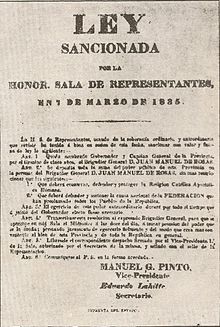Sum of public power
| Sum of Public Power | |
|---|---|

Ruling of the Legislature
|
|
| Created | 1835 |
| Signatories | Legislature of Buenos Aires |
The sum of public power (Spanish: Suma del poder público) is a legal term from Argentina, included in its constitution. It represents the sum of the three powers, and deems the complete delegation of them into the executive power as a crime of high treason.
The term was created in 1835, when governor Juan Manuel de Rosas was granted such powers by the legislature of Buenos Aires. Justo José de Urquiza led an army to depose Rosas in order to enact a Constitution, which Rosas had delayed for years, and the 1853 Constitution legally forbade such a thing from happening again.
The death of the federalist caudillo Facundo Quiroga caused great concern in the Argentine Confederation, and soon the legislature of Buenos Aires elected Rosas as governor. A law from Augusto 3, 1821, allowed the legislature to grant those powers. Those powers were fully delegated on him, with the sole exceptions of keeping, defending and protecting the Roman Catholic Church, and keeping and defending the cause of the Confederation. The term of office of the governor, of three years, was extended to five years. The legislature reelected Rosas three times, allowing him three full mandates of 5 years, being overthrown during the fourth. Rosas could use the sum of public power during any time period he deemed convenient during his mandate.
To confirm the legitimacy of his mandate, Rosas requested a vote to approve or reject him. Although there was no universal suffrage in Argentina by then, Rosas requested that all the people in Buenos Aires was allowed to vote, regardless of wealth or social conditions. This proposal was influenced by Jean-Jacques Rousseau's The Social Contract. The only ones who could not vote were the women, the slaves, children under 20 years old (unless emancipated) and foreigners without a stable residence in the country. The final result had 9720 votes for Rosas and only 8 against him.
...
Wikipedia
